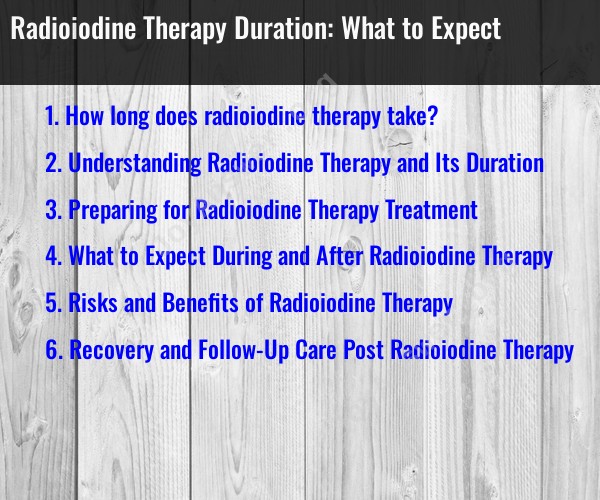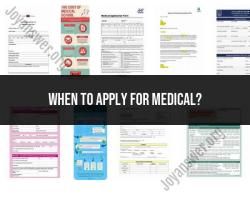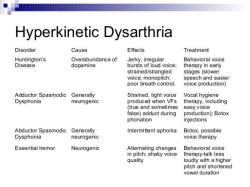How long does radioiodine therapy take?
The duration of radioiodine therapy, also known as radioactive iodine (RAI) treatment, can vary depending on several factors, including the specific medical condition being treated and the dose of radioactive iodine administered. Radioiodine therapy is primarily used for the treatment of thyroid conditions, such as hyperthyroidism or thyroid cancer. Here's a general overview of what to expect in terms of duration for different radioiodine therapy scenarios:
Hyperthyroidism (Graves' Disease or Toxic Nodules):
- In cases of hyperthyroidism, a typical single dose of radioiodine therapy is administered as a capsule or liquid. The duration of hospitalization or isolation after receiving the treatment can vary. In many cases, patients may need to remain isolated from others for a period of a few days to a week to limit radiation exposure to others.
Thyroid Cancer (Differentiated Thyroid Carcinoma):
- The treatment plan for thyroid cancer may involve a single or multiple doses of radioiodine therapy. The length of time for the therapy can vary significantly based on the patient's condition and the specific treatment plan designed by the healthcare team.
- In some cases, a single outpatient dose is administered, and patients may need to take certain precautions for a few days to a week after the treatment to minimize radiation exposure to others.
- For more advanced or recurrent thyroid cancer cases, multiple doses of RAI treatment may be administered, which can extend the overall duration of treatment.
Preparation and Follow-up:
- In preparation for radioiodine therapy, patients may need to follow dietary restrictions and temporarily discontinue medications that could interfere with the therapy. This preparation period can last from days to weeks, depending on the specific recommendations.
- After receiving radioiodine therapy, follow-up appointments and monitoring may be necessary to assess the treatment's effectiveness and adjust medication doses if needed.
It's important to note that the exact duration of radioiodine therapy will be determined by the healthcare team based on the patient's individual circumstances, the type and stage of the thyroid condition, and the treatment plan. Patients should closely follow their healthcare provider's instructions regarding isolation, medication, dietary restrictions, and any necessary safety precautions during and after the therapy.
Additionally, the specific radioactive iodine dose and its half-life (the time it takes for half of the radioactive substance to decay) will influence the duration of isolation and safety measures. It's essential to discuss all aspects of the treatment plan with your healthcare provider to fully understand what to expect during and after radioiodine therapy.
Understanding Radioiodine Therapy and Its Duration
Radioiodine therapy, also known as radioactive iodine therapy or RAI therapy, is a type of nuclear medicine treatment used to treat certain types of thyroid cancer and hyperthyroidism. It involves administering a radioactive isotope of iodine, iodine-131 (I-131), which is absorbed by thyroid cells. The radiation emitted by I-131 destroys thyroid cells, effectively treating the condition.
The duration of radioiodine therapy depends on the specific condition being treated and the individual patient's circumstances. For thyroid cancer, the treatment is typically given in one or two doses, with each dose being administered several weeks apart. For hyperthyroidism, the treatment is usually given in a single dose.
Preparing for Radioiodine Therapy Treatment
Before undergoing radioiodine therapy, patients will need to undergo certain preparations:
Low-iodine diet: Patients will be advised to follow a low-iodine diet for several weeks before the treatment to reduce the amount of iodine in their bodies, allowing for better uptake of radioactive iodine.
Thyroid medication adjustments: Patients taking thyroid medication may need to adjust their dosage or stop taking it altogether before the treatment.
Pregnancy and breastfeeding: Radioiodine therapy is not recommended for pregnant or breastfeeding women due to the risk of radiation exposure to the fetus or infant.
Medical clearance: Patients will need to undergo a medical evaluation to ensure they are healthy enough for the treatment.
What to Expect During and After Radioiodine Therapy
During the treatment:
Iodine-131 administration: Patients will be given a capsule or liquid containing I-131 to swallow. The procedure is quick and painless.
Isolation period: After the treatment, patients may need to be isolated for a short period to minimize radiation exposure to others. This isolation period typically lasts for 2-3 days.
After the treatment:
Side effects: Some common side effects of radioiodine therapy include dry mouth, loss of taste, and temporary neck discomfort. These side effects usually resolve on their own within a few weeks.
Recovery period: Patients may need a few days of rest after the treatment to allow the body to recover.
Follow-up care: Regular follow-up appointments with the doctor will be necessary to monitor thyroid function and treatment effectiveness.
Risks and Benefits of Radioiodine Therapy
Benefits:
Effective treatment for thyroid cancer and hyperthyroidism
Non-invasive and minimally-invasive procedure
High cure rates for thyroid cancer
Risks:
Temporary side effects, such as dry mouth, loss of taste, and neck discomfort
Rare risk of permanent side effects, such as infertility and salivary gland damage
Radiation exposure to others during the isolation period
Recovery and Follow-Up Care Post Radioiodine Therapy
Recovery from radioiodine therapy is generally quick and uneventful. Most patients can resume their normal activities within a few days. However, it is important to follow the doctor's instructions carefully, which may include:
Maintaining a low-iodine diet for a few weeks after the treatment
Drinking plenty of fluids to help flush out the radioactive iodine
Taking precautions to minimize radiation exposure to others during the isolation period
Regular follow-up appointments with the doctor will be necessary to monitor thyroid function and treatment effectiveness. These appointments may include blood tests, thyroid scans, and physical examinations.













